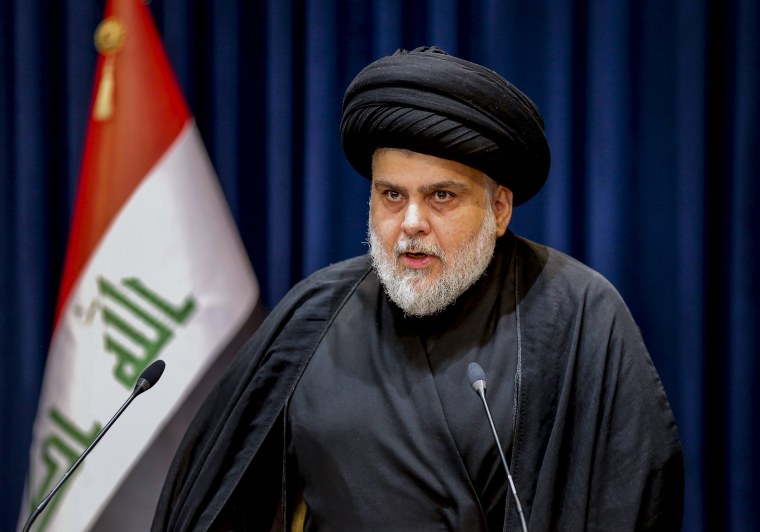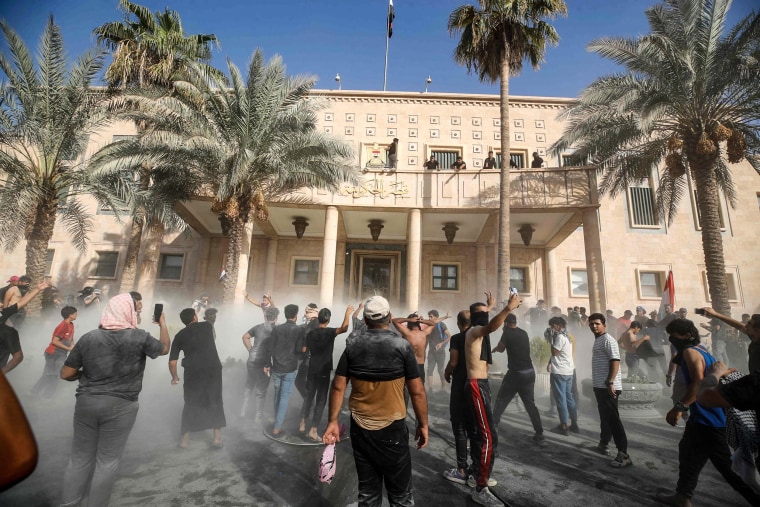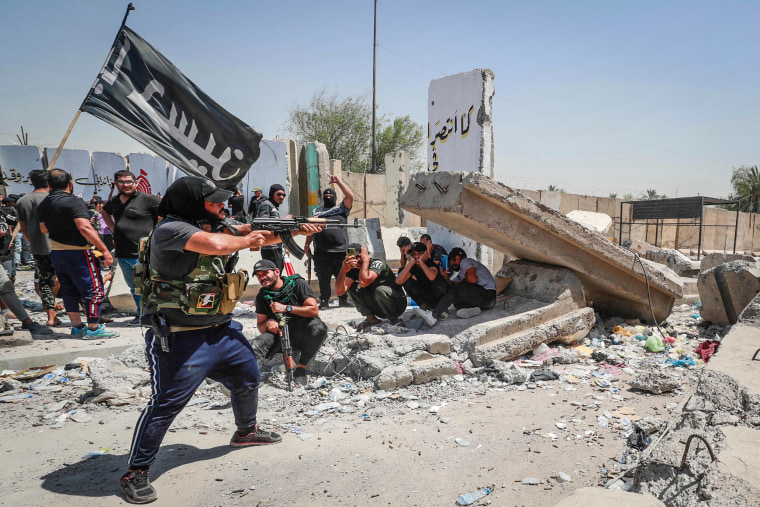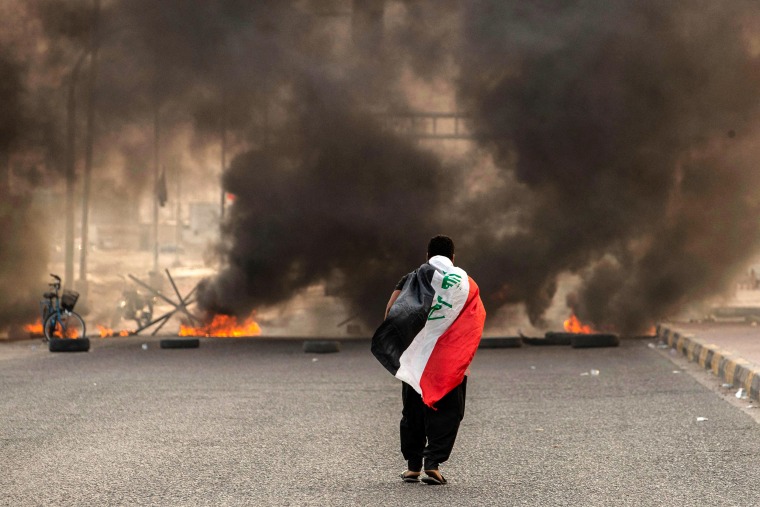BAGHDAD — Parts of Iraq descended into deadly street clashes this week as followers of powerful cleric Muqtada al-Sadr traded fire with security forces and fellow Shia Muslim militias, a sudden outburst of violence that followed years of the country fading from the international spotlight.
Many Americans got to know al-Sadr when his Mahdi Army fought pitched battles against American soldiers after the 2003 invasion of Iraq that deposed dictator Saddam Hussein. Now, he has positioned himself as a nationalist leader in opposition to militias closely aligned with neighboring Iran.
Here's what's been happening and why.
What happened?
On Monday, al-Sadr, whose party won the most seats in parliamentary elections but not enough to form a government, announced he would resign from front-line Iraqi politics after months of political wrangling.
This prompted hundreds of his supporters to storm the Baghdad government palace, clashing with security forces.
Al-Sadr's loyalists pulled down the cement barriers outside and breached its gates, The Associated Press reported. Many rushed into its lavish salons and marbled halls, a key meeting place for Iraqi heads of state and foreign dignitaries.

Iraq's military said four rockets were fired into the city's Green Zone, a fortified central neighborhood that houses government buildings and international embassies. Iraqi security forces appeared to be firing back, the AP reported from the city.
In response, al-Sadr's opponents, the Iran-aligned Popular Mobilization Forces, sent loyalists to Baghdad’s Green Zone, "risking conflict between the two heavily armed sides," according to a briefing by the London think tank Chatham House.
Much of the cleric's grassroots support comes from Baghdad's Sadr City — which he renamed in honor of his late father. "People were in a rage, firing bullets in the air," Mohammed Abed Hassan, 49, a high school teacher and father of two, said of the violence.
Although it is still unlikely this will lead to a Shia civil war, there are increasing concerns about the lengths Sadr is willing go to.
Chatham House think tank briefing
There have been reports of up to 30 people killed and 400 injured, but the government has not released official figures.
Then — in a stark display of al-Sadr’s power and influence — almost as soon as he said the word "withdraw" at a news conference Tuesday, his loyalists ceased the violence.
That was reinforced when the country's caretaker prime minister, Mustafa al-Kadhimi, even thanked al-Sadr on Twitter, saying his call to stop the violence was "the epitome of patriotism and respect to the sanctity of Iraqi blood."
Why did the violence start?
The street battles are a symptom of a power vacuum in Iraqi politics that many analysts regard as the greatest threat to the country's stability after years of war, civil unrest and the Islamic State terrorist group's militancy.
Sectarian violence has been a common theme in a country populated by Shia, Sunni and Kurdish groups all vying for influence and wary of being marginalized.
But the current tension is within Shia groups themselves, namely al-Sadr's political party and other Shia parties backed by Iran, which still holds significant sway in Iraq.
In 2021 after al-Sadr's party's parliamentary election victories, he also refused to negotiate with the Iran-backed parties — locking Iraq in a political stalemate that has lasted the best part of a year.

In July, his supporters broke into the Parliament in an attempt to deter these rivals from forming a coalition.
Though oil rich, Iraq’s has struggled since the U.S. invasion and the ensuing chaos and civil war. The country’s hollowed-out economy is plagued by 14% unemployment and a creaking infrastructure that often does not deliver the most basic services.
Many of al-Sadr's supporters who stormed the Parliament in July and again Monday are among the country's most impoverished and blame the political elite for what they see as their marginalization.
To them, al-Sadr will revolutionize a political system they believe has forgotten about them.

"He is my leader," said Ameer Hussein, 25, a taxi driver from Sadr City. "We live in very poor conditions. Al-Sadr asked to develop services that help Iraqis to live in a better situation."
Of the violence this week, he added, "Sometimes we have to show that we can act in order to send a message to others that they cannot neglect us."
In reality, far from being a disruptive outsider, al-Sadr holds significant power and sway in Iraq’s power-sharing system.
What's the background?
Al-Sadr derives much of his support from his family legacy. His father was the Grand Ayatollah Mohammed Sadeq al-Sadr, who was assassinated in 1999 for his critical stance against Saddam.
Inside Iraq, he is known for his powerful rhetoric and speeches that often called for revolution and resonated with those on the wrong side of Iraq's yawning financial and class divides.
To Americans, however, he is better known as one of the leading opponents of the U.S.-led occupation of Iraq after the invasion in 2003, inciting protests for the troops to leave. His Mahdi Army — later renamed the Peace Brigades — clashed with coalition troops during the chaotic and violent post-invasion years.
The current turmoil shows his influence has not faded — if anything, it has grown.

It also appears to be a grave concern for Iran, whose Supreme Leader Ayatollah Ali Khamenei has repeatedly called for Shia unity and even attempted to broker dialogue with al-Sadr.
But the cleric has refused, firm in his resolve to form a government without Tehran-backed troops.
It's unclear how the impasse can break.
"Although it is still unlikely this will lead to a Shia civil war, there are increasing concerns about the lengths Sadr is willing go to," the Chatham House briefing said. Al-Sadr’s "aim is not revolution or overturning the political system, but rather to gain more power from his Shia opponents."
Khalid Razak reported from Baghdad, and Alexander Smith reported from London.
